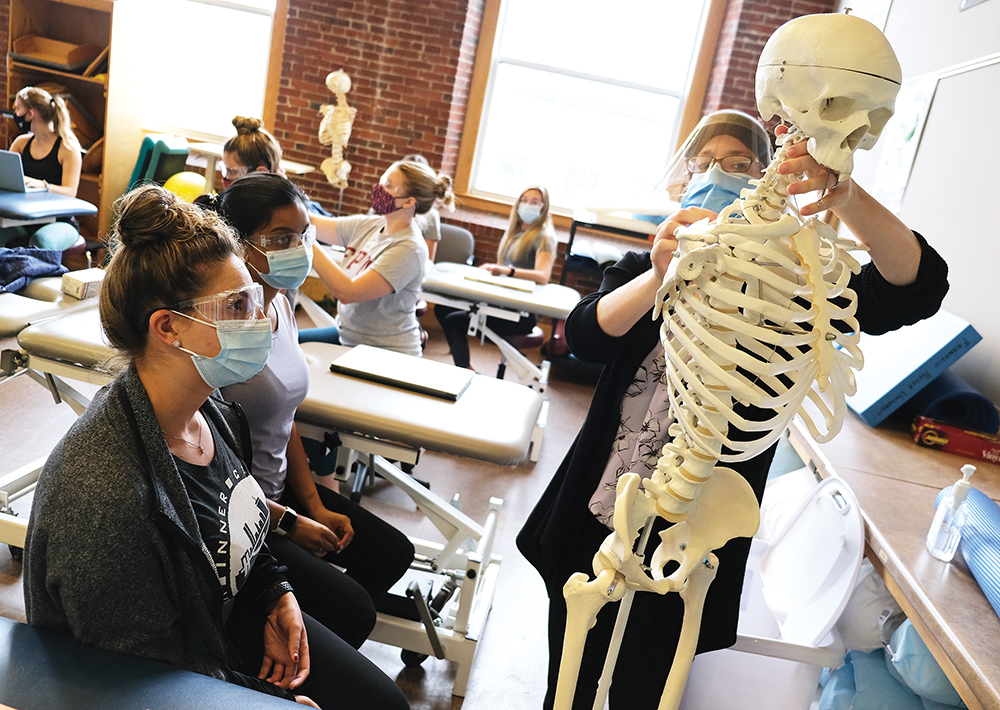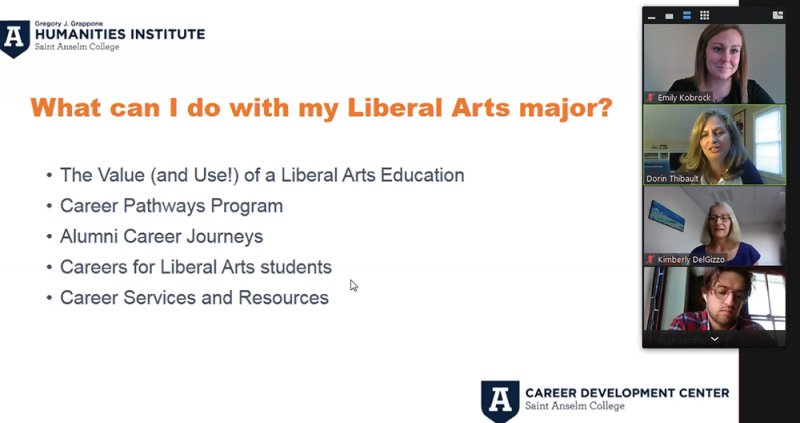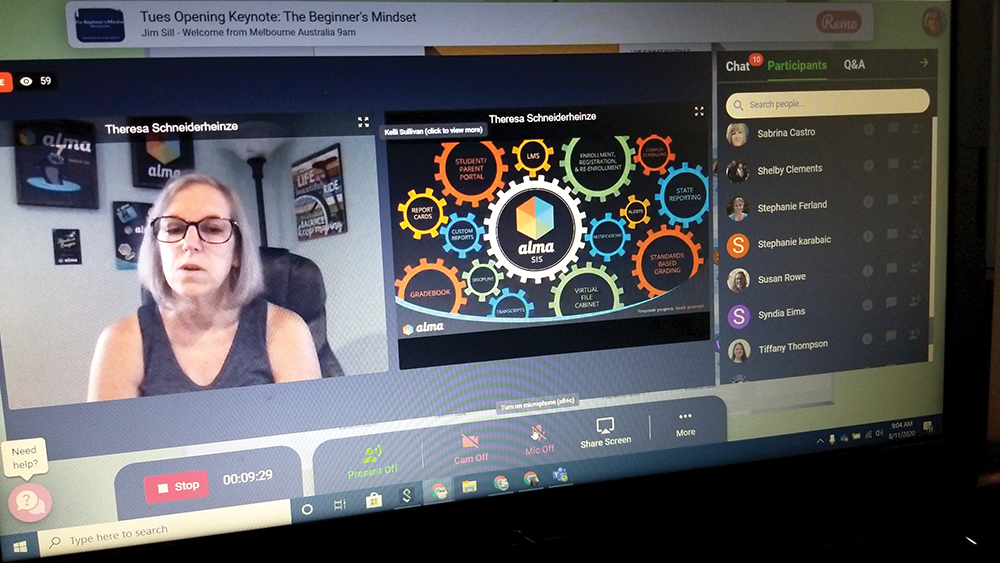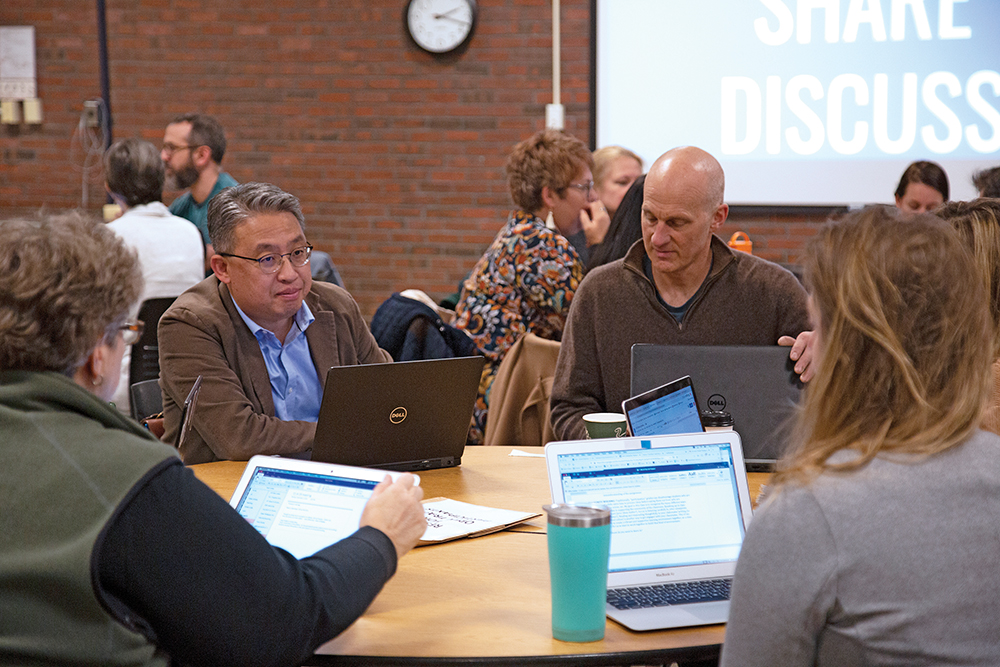
Students in the physical therapy doctorate program at Franklin Pierce University. Courtesy photo.
As one of the sectors most affected by the pandemic, educational institutions are adjusting professional development offerings to address immediate workforce needs amid an uncertain future.
As universities and community colleges roll out training to help workers deal with pandemic stress and gain new skills, they strive to meet workforce shortages that still challenge NH employers despite higher jobless numbers.
Mike Mengers, director of UNH Professional Development and Training at the University of NH in Durham, says topics relevant to the pandemic are seeing more enrollment, such as emergency preparedness or leading virtual teams. “We also have a lot of programs for coping with stress for K-12 educators. These more niche programs are now very relevant, and we’re seeing greater enrollment directly tied to COVID.”
A program for health care professionals, titled Increase Resilience, Energy, and Emotional Well-Being While Reducing Your Stress, was one of many developed in response to the pandemic. “We had to get our bearings then adapt to the needs of the market,” he says. “We have brand new classes that we were able to turn around quickly because we had a built-in instructor base to repackage past programs and make them more relevant to what is going on.”
The two areas of professional development that have seen the greatest growth, whether short-term classes, micro-credentials or add-on degrees, have been health care and education with interest in lesser-known subjects rising to the top.
Health Care Courses on the Rise
At Rivier University in Nashua, the president, Sister Paula Marie Buley, says the pandemic has led to an increased awareness and interest in public health. “As the general population begins to learn more of what public health professionals do, words that had not touched our vocabulary such as epidemiology, contact tracing and positivity rates are now common. Public health and its role in public safety and personal safety has generated more interest.”
She says public health professionals work in a variety of settings, such as contact workers in school districts or city government, epidemiology, public health nursing and even insurance companies. “I think we’ll see public health professionals being hired by larger corporations, and it may well be a C-level suite job,” says Buley. “Employees at large corporations are expecting evidence-based strategy; they’re requiring data and transparency. While human resource departments have been the de-facto public health for a lot of businesses, that is no longer adequate.”
Franklin Pierce University in Rindge is also seeing greater interest in health care curriculum, says Heather LaDue, executive director of professional programs and partnerships, where professionals can add on to a degree they already have. “The pandemic prompted many people to reassess their priorities and to look for fields that are in great demand.”
The health care industry went into the pandemic with a serious workforce shortage that continues to drive demand for professional development, says Brian Bicknell, president of Manchester Community College (MCC). “Whether it’s nursing, medical assistants or LNAs, it continues to be a real pressure point,” he says.
Before the pandemic, MCC already designed a hybrid licensed nursing assistant (LNA) program, which teaches theory online and clinicals in person, says Kristine Dudley, director of MCC’s Workforce Development Center. In response to the pandemic, the school offered two summer LNA classes in partnership with NH Employment Security for people changing jobs and looking for a new field or retooling their career.
“We try to make the connections, we work with the state, look for candidates that are looking for this work. We provide the training and, on the back end, we work with employers to try to fill their needs.” she says.
Allison Mollica, director of the Business and Industry Training Center at NHTI-Concord’s Community College, says health care continues to dominate the credit courses, which have been offered during the pandemic as a hybrid model.
Franklin Pierce offers an accelerated master of science in nursing for professionals who hold a bachelor’s degree or higher in another field and want to pursue nursing as a second career. LaDue says higher demand also extends to the doctor of physical therapy program in Manchester and master of physician assistant studies program in Lebanon, which trains health care professionals for rural and medically under-served communities.
Rivier’s doctor of nursing practice for RNs is one of many areas driving interest in biostatistics, as it relates to population health looking at ethnicities and demographics, says Buley.
“We must make sure we understand big data so that we can target evidence-based strategies for health care. We’ve seen a lot of interest as we look at health inequities and health access across different populations,” says Buley. “If we have learned anything, it’s that you need to be educated and can’t just take what the numbers say; you must ask what they mean.”
Community health nursing is also increasing, according to Buley, as nurses move away from hospital-based care and into telehealth where students are engaged in much greater use of technology, not just to communicate, but also to diagnose through telemedicine.
Career Changers and the Jobless
Professional development can be a challenge, says Mengers of UNH, because too often those who need it most find it hard to make the time. “Our game plan for the last year or two was already focused on unemployed and underemployed. They really need those highly technical skill gains of a boot camp.”
He says UNH has seen increased demand for programs and boot camps that offer a significant skill gain, such as coding, UX/UI (user experience/user interface), drone academy and privacy management. Mengers adds UNH also introduced in the past year specific tracks to target workforce shortages, including dental assistant and clinical medical assistant programs.

A coding bootcamp at the University of NH. Courtesy photo.
Dudley at MCC says there’s a shift in technology training. “We are seeing less of the traditional professional development like Microsoft and seeing more of the things that support the technology demands of the pandemic, such as website development to provide tools that businesses need now.”
Kimberly Eckenrode, CTE computer training coordinator at Nashua Community College (NCC), says the school recognized people need to improve technology skills and began offering Microsoft training through a self-paced online program. “Some were there for employers, others were unemployed or looking to change jobs,” she says. “Because it was online and self-paced, we even had some out-of-state students contact us because they couldn’t find it online anywhere else.”
She says NCC is also a Certiport authorized testing center and is able to test virtually, giving people the opportunity to earn Microsoft certification. “We are drawing in people from all over the country contacting us since not all test centers are offering online testing. We see a lot of people who are out of work or recent graduates who want the certification to prove their knowledge.”
At Southern NH University in Manchester, Pete Davis, vice president of product marketing, says demand for online programs has surged since last spring. “SNHU has always welcomed students looking to change careers, which is a situation many people find themselves forced into. We are also seeing many undergraduate students who have decided now is the time to finish that bachelor’s degree that they may have started years ago.”
He says many who have been furloughed and have extra time are using it to pursue a degree as are others who are working from home and have more time to dedicate to schoolwork since they aren’t commuting and/or don’t have as many extracurricular activities in off-work hours. Others just want to upskill for the post-COVID-19 economy.
“We have seen an uptick in interest of students wanting to pursue advanced degrees. Between layoffs and the disappointment of learning their roles weren’t essential, many new learners want the competitive edge of a master’s when re-entering the job market,” says Davis.
LaDue of Franklin Pierce says this is “a perfect time to gain new competencies and skills. We’re even offering a 40% discount on our online classes to anyone who is currently receiving unemployment benefits here in New Hampshire. It’s one of the ways we are trying to help during a very difficult time for many in the Granite State.”
Prepping Graduates
While professional development typically occurs after college, Kimberly DelGizzo, executive director of the Career Development Center at Saint Anselm College, says an early focus on career development is more important amid the uncertainty of the pandemic.
Students typically look to their school’s career development program in their junior or senior year, DelGizzo says. But at Saint Anselm they believe that process should begin on day one, to help them think about what the right fit is and help them develop strategies for their future career and make informed decisions along the way.

Saint Anselm College career development center created Zoom sessions to help students stay plugged in to their professional development. Courtesy photo.
“When COVID hit, employers [slowed down] posting internships and full-time opportunities for graduates, so we developed an initiative where the career office team called [2020 graduates] to see how they and their family were doing, to let them know we were here for them and to ask about their job search,” she says.
A few graduates had job offers rescinded or delayed, and DelGizzo says those who had challenges were happy to know the resources were still available to them. Some specific programs developed in response to the pandemic included Zoom sessions to help students and recent graduates use the time in lockdown wisely and “stay plugged in to their professional development,” and career chats with industry professionals to learn how companies were handling COVID-19 and how students could pursue opportunities with those employers. Saint Anselm also initiated “Hire Anselmians” to ask alums if they could offer short-term projects, internships or jobs to recent graduates.
The Upside of Virtual
The pandemic has legitimized the idea that people can learn online, Mollica says, and that the virtual learning space can be an enriching experience. “We [hosted] a virtual learning summit that had been done face-to-face in prior years. We had instructors from Fresno, Orlando, Michigan and Australia. We’d never be able to bring them in physically, but because it was virtual, we could pick the best of the best,” Mollica says.
NHTI is seeing a drop in registrations for one-day sessions for micro-credentialing programs. “Being educational experts, we know if someone wants to learn something in-depth, they are not going to learn it in a day,” says Mollica. Instead, those credentialing courses are now being offered over a six-week period to make it easier for people to work it into their schedules and achieve a deeper level of learning.

NHTI’s virtual learning summit included instructors from around the globe. Courtesy photo.
Plymouth State University (PSU) in Plymouth has focused heavily on development for educators, including its own faculty who hit the books, or rather the computers, the week after spring finals, says Ann McLellan, interim provost and vice president of academic affairs.
PSU’s center for collaborative learning, or CoLab, developed a four-week course for instructors on issues related to online and hybrid teaching, including how to use new technology, how to build effective online courses and how to use online instructional design in ways that provide equitable access.

Plymouth State University faculty participating in the institute’s CoLab course. Courtesy photo.
“It is a big conversation we’ve been having in higher education and I’m sure in public education as well,” says McLellan. “We make a lot of assumptions about accessibility, both for students and teachers in our communities: that everyone has access, their own devices, web cams and reliable internet. Some of our instructors in parts of Plymouth might not even have reliable internet.”
She adds they are also working with vendors to provide closed captioning and exploring how to provide accommodations for students with learning disabilities.
Pandemic-driven changes to educational models will remain, says Bicknell, and continue to evolve to include topics already being taught in MCC’s computer science classes, such as virtual and augmented reality. “When we get to the other side of this, it will really be a positive thing. If need is the mother of invention, the pandemic served as a forcing function,” he says. “This technology is enabling us to be better at educating our students.”

 Current Issue - April 2024
Current Issue - April 2024